April 22 is Earth Day, which began in 1970 as a national day to focus on the natural world. Earth Day is a great reminder to connect with the coast—and here are 50 suggestions for protecting the Bay State shoreline all year long!
50 Ways...
- Sign up for COASTSWEEP - COASTSWEEP is the statewide beach cleanup sponsored by CZM as part of Ocean Conservancy’s International Coastal Cleanup. Each fall, volunteers from around the world collect marine debris—trash, fishing line, and any other human-made items—and categorize and tally what they find. This information is then used to help determine the sources of marine debris and find solutions to this problem. See the COASTSWEEP website for how to volunteer for a cleanup starting in August. Or even better, sign up now to organize your own cleanup this fall. Send your contact information to coastsweep@mass.gov for more information.
- Take care of your trash - Litter on land makes its way to Massachusetts beaches when it is washed to the nearest river, stream, or storm drain and then out to sea. Proper trash disposal directly helps to keep our coast clean. See CZM’s More on Marine Debris for details.
- Keep your butts off the beach - Year in and year out, cigarette butts are by far the most commonly collected type of marine debris. Most have been tossed on the street and washed into a storm drain. Check out About COASTSWEEP for more.
- Refocus your daily routine to reduce, reuse, and recycle - Have you ever thought about how much trash you produce in a single day and how you can reduce your personal impact? Find some great tips in COASTSWEEP: Altering the Average Day to Reduce Ocean Litter, a blog post from a COASTSWEEP intern on how he spent a day doing just that.
- Repurpose with the purpose of reducing marine debris - Repurposing gives items that would otherwise be thrown away or recycled a useful new life. From transforming a glass jar into a terrarium to making decorative pillows with plastic-bag stuffing, see CZ-Tip - Repurposing with a Purpose for some great ideas on turning trash into treasure. For further inspiration, see COASTSWEEP: The Cathartic Art of the Beach Cleanup for a feel-good story about one local marine-debris artist.
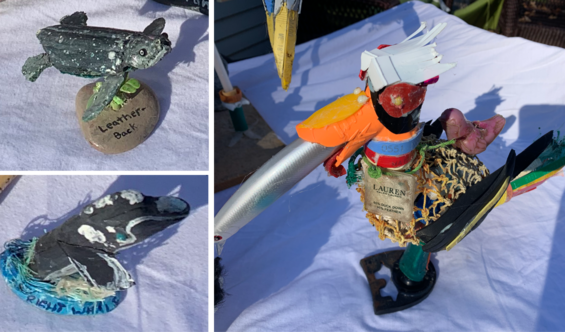
These marine-debris characters were created out of trash found at the beach (by Mary Delmonaco).
- Recycle smart - Can you recycle a pizza box? What about AAA batteries? Plastic wrap? Knowing what to put in your curbside recycling box can be confusing—and adding the wrong things actually does more harm than good. (For instance, plastic bags get wrapped in the gears of recycling equipment.) To provide an easy way to end the confusion, the Massachusetts Department of Environmental Protection (MassDEP) initiated Recycle Smart. Just type the name of an item into this online guide to find out how to properly recycle it.
- Clean the “green” way - Commercial cleaning products can contain ingredients that impact the coast—such as phosphates that cause excess algae growth (which robs ocean water of oxygen) or chemicals that are toxic to marine life. See CZ-Tip - Get Your Home Squeaky Green-Clean for environmentally friendly cleaning options that can also save you money and protect your health.
- Safely manage household hazardous products - Paints, used oil, fluorescent bulbs, and other common household products can contain toxic chemicals that can harm your health and the environment. For information on how to safely handle, dispose of, and recycle these materials, see MassDEP’s Safely Manage Hazardous Household Products page.
- Properly dispose of prescription drugs - Prescription drugs can negatively impact plants and animals when they make their way to the marine environment after being dumped into the toilet or down the drain. MassDEP has specific tips on how to Safely Dispose of Prescription Drugs.
- Filter pollution with plants - Stormwater (rain and snow melt that runs over the ground, picking up sediments and other pollutants along the way) can significantly impact coastal waters. Planting vegetated buffers—strips of shrubs, perennials, or other (preferably native) plants—is a great way to reduce stormwater impacts. These buffers effectively slow surface runoff, capture stormwater, and filter contaminants. Learn more with CZ-Tip - Keep Waterways Clean by Filtering Pollutants with Plants and the CZM Stormwater Solutions for Homeowners Fact Sheet: Vegetated Buffers.
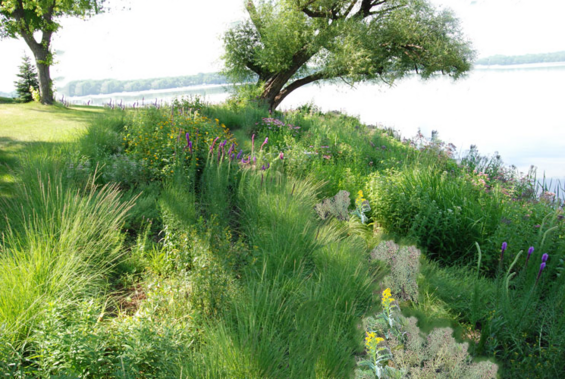
A vegetated buffer is a beautiful way to filter runoff to prevent pollution in nearby waterways.
- Use the power of plants to control coastal erosion - With roots that bind soils and leaves that break the impact of rain or wave splash, plants can protect your property from coastal erosion. See CZ-Tip - Dune Building with Beachgrass for information on using this native grass to help build and maintain dunes, and StormSmart Properties Fact Sheet 3: Planting Vegetation to Reduce Erosion and Storm Damage for the benefits of using plants to combat erosion, along with specific design considerations to ensure project success.
- Go native with your landscaping - Native plants (i.e., those that originally grew in this area) are adapted to local conditions and consequently require less maintenance, watering, fertilizer, and pest control than introduced species—so choose native species for your planting plans. See Coastal Landscaping in Massachusetts - Plant Highlights and Images for photos and descriptions of a wide range of native plants to choose from (many of which are suitable for inland sites too).
- Protect shorebirds while walking the beach - Foot traffic in and around nesting areas can significantly impact the reproductive success of Massachusetts shorebirds, including the threatened or endangered species that live here. From mid-April though summer, be on the lookout for nests and baby birds at the beach. For specific tips—from staying out of wildlife protection areas to leashing your pets—see “What Beachgoers Can Do to Protect Shorebirds” in CZ-Tip - Birdwatching on the Coast.
- Drive “bird safe” on the beach - Shorebirds often hide in tire tracks, making them vulnerable to off-road vehicles. When driving at the beach, be sure to stay outside of delineated shorebird habitat (which is designated in May and marked by postings or fencing). See “What Beach Drivers Can Do to Protect Shorebirds” in CZ-Tip - Birdwatching on the Coast for more.
- Be a beach-friendly dog owner - Through no fault of their own, dogs can cause some serious seashore impacts. But with some common sense, a leash, and a baggie, you can be a beach-friendly dog owner. From respecting leash laws to scooping the poop, CZ-Tip - Bring Your Dog to the Beach the Coast-Friendly Way covers how to responsibly share the coast with your canine.
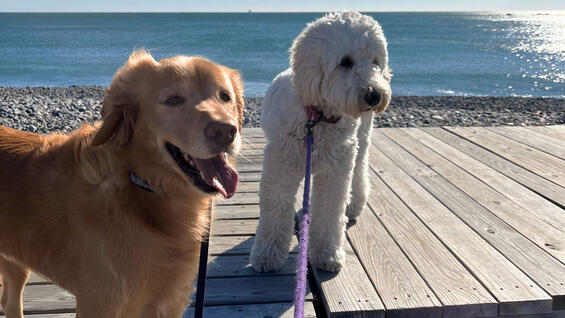
Leashing your dogs at the beach and picking up their waste help protect wildlife and keep coastal waters clean.
- Don’t dump down storm drains - Never throw trash, pour used oil, or dump anything else into a storm drain. These drainage systems ultimately carry everything they catch into rivers, streams, and out to sea. The “Clean Coastal Waters” section in CZ-Tip - Be a Coast-Conscious Kid! provides additional information, including how to help stencil storm drains to remind other people not to dump.
- Wash your car wisely - Instead of washing your car at home where chemical detergents, oils, and greases can contaminate runoff, go to the car wash. Commercial car washes collect wash water for treatment and recycling and use significantly less water (35-50 gallons compared to 80-140 gallons at home). If you do wash your car at home, park on a lawn or gravel area so water can be absorbed and filtered into the ground and use phosphate-free soaps (or spot-clean with an eco-friendly cleaner and rag) to help reduce polluted runoff. See the Massachusetts Clean Water Toolkit’s Car Washing page for details.
- Save water - Water conservation helps maintain water levels in rivers and streams to protect habitat for fish and other species and improve the quality of the water that runs to the sea. CZ-Tip - Save Water gives links to extensive information on how to conserve water in your home, yard, and business.
- Install a rain barrel - A rain barrel is a container placed under a downspout to collect rain from the roof. This free source of recycled water can be used on perennial beds and lawns, rather than tap water. See MassDEP’s rain barrel guide for instructions on making, buying, and installing a rain barrel, along with other water conservation tips.
- Save energy - Burning fossil fuels such as oil and coal releases carbon dioxide and other heat-trapping "greenhouse gases"—a key factor in climate change. Climate change impacts include increasing global temperatures, melting ice caps and sea level rise, and increased frequency and severity of storms—all of which exacerbate coastal erosion and storm damage. You can do your part to combat climate change by saving energy. See the Massachusetts Department of Energy Resources Energy Efficiency for Your Home website for links to services and incentives to manage energy use.
- Take public transportation (by boat!) - Public transportation is a great way to reduce your fossil fuel consumption to help protect the planet—and the Bay State offers many water-based public transportation options. See CZ-Tip - Public Transportation by Boat for details on taking a ferry to work or to a weekend getaway.
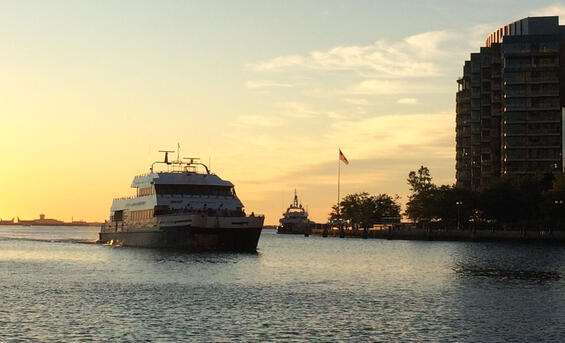
Commute to Boston by boat (and get the bonus of beautiful sunrises)!
- Recycle fishing line - Discarded fishing line can entangle marine animals and get wrapped around boat propellers. Always properly dispose of used fishing line, or even better, find out how to recycle it in the “Marine Debris” section of CZ-Tip - Simple Steps to Clean Boating in Massachusetts.
- Stop the spread of marine invasives - Invasive species are animals and plants (and other organisms such as bacteria) that are introduced to new locations by human activity and can cause harm to the environment, economy, or public health. From properly disposing of used bait to never releasing aquarium pets to the wild—find ways to protect the Massachusetts coast from these intruders in CZ-Tip - Learn to Spot, and Deal with, the Aliens in Our Midst.
- Help identify invaders - The Marine Invader Monitoring and Information Collaborative (MIMIC) brings together volunteers and scientists to monitor for marine invasive species along the New England coast. See CZM’s MIMIC page for information on how to get your environmental group involved. Also, if you see a marine invasive species (such as an Asian Shore Crab or a European Oyster), please take a photo and add it to the iNaturalist MIMIC project page. Not sure if it’s invasive? Check out these Marine Invasive Species Identification Cards to find out.
- Stop the spread of invasive plants - Invasive plants can outcompete native species and disrupt coastal ecosystems. To help prevent their spread, never plant invasives in your yard and don’t use them to decorate (which can spread their seeds). For details, see the MassWildlife Natural Heritage & Endangered Species Program’s Invasive Plants page.
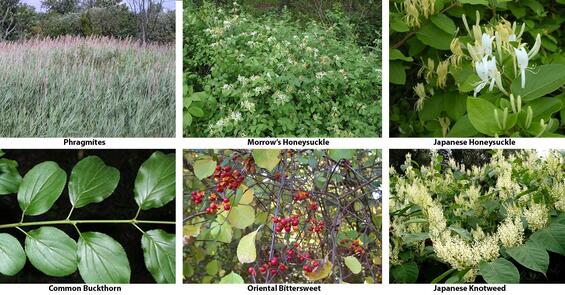
The dirty half-dozen - These common invasive species can overtake woodlands, clog salt marsh shorelines, and outcompete native plants in Massachusetts.
- Help protect rare species - The North Atlantic Right Whale, Roseate Tern, and Eastern Spadefoot toad are some of the many endangered or threatened species of the Massachusetts coast. The Natural Heritage & Endangered Species Program’s support endangered species conservation page gives information on how you can help by donating to their protection. In addition, check out CZM's CZ-Tip - Help Protect At-Risk Wildlife and Plants in Massachusetts Coastal Habitats on protecting the unique coastal and ocean habitats of Massachusetts and some of the threatened and endangered animals and plants that depend on them.
- Report rare species sightings - You can also help track the success of Massachusetts conservation efforts by reporting rare species when you find them. See report rare species for instructions on providing information to the state’s database of rare species records.
- Protect sea turtles right here in the Bay State - Did you know that during the summer and fall, four species of endangered or threatened sea turtles are commonly found in Massachusetts waters (Green, Kemp's Ridley, Leatherback, and Loggerhead)? CZ-Tip - Sharing Coastal Waters with Sea Turtles gives details on how to protect sea turtles when you boat, fish, and stash your trash.
- Help save stranded and entangled turtles - There are two sea turtle stranding seasons in Massachusetts: 1) summer and fall when turtles are susceptible to entanglements and boat collisions, and 2) late fall and winter when turtles go into shock from dropping water temperatures. See CZ-Tip - Sharing Coastal Waters with Sea Turtles for information on what to do if you find a sea turtle in trouble (including how to report it).
- Report lost fishing gear - Lost fishing gear washed up on the beach can often be reused. If you find lobster pots, buoys, or other gear with identification numbers on it, note the numbers and report them to the Massachusetts Environmental Police dispatcher at (617) 626-1650. (Fishing gear with no identification number that is clearly damaged beyond use may be disposed of or recycled.) Learn more with CZ-Tip - Learn About Lobsters, Lost Gear, and Local Efforts to Prevent Marine Debris.
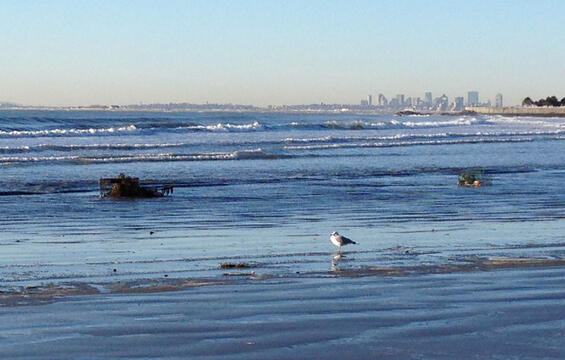
Lobster pots and gear washed up on the shore after a winter storm.
- Create wildlife habitat - Trees, shrubs, groundcovers, and grasses—particularly native species—provide shelter, nesting areas, and food for wildlife. With a little planning, you can use native plants to create wildlife habitat when you landscape your coastal property. Learn more with Benefits of Coastal Landscaping. (These tips also work in inland areas, so give them a try wherever you live!)
- Leave wildlife wild - When beachcombing, please leave anything alive where you found it, including sand dollars, sea stars, shellfish, and crabs. Also, do not step on or collect wildflowers or other vegetation—plants prevent erosion and provide habitat and food for wildlife. Finally, not all sea creatures on land are in trouble. Seals, for instance, often look stranded when they haul themselves on land to rest. Give them the space they need by keeping at least 150 feet away. For more, including how to report a beached whale or other truly stranded animal, see CZ-Tip - 10 Ways to Find, Safely Enjoy, and Protect Massachusetts Beaches.
- Take care of tide pools - As the tide recedes, the tide pools that form in isolated low spots provide habitat for many marine plants and animals. Exploring tide pools is an excellent, hands-on way to learn about marine life—but please handle these creatures with care. For example, when you turn over a rock to check for crabs, put it back the way you found it to shelter the animals that live there. For more on “tide pool etiquette” (along with information on where to find some of the best tide pools in Massachusetts), see CZ-Tip - Learn What Lurks in a Massachusetts Tide Pool.
- Inspire coast-friendly kids - To help engage the next generation in protecting the coast, see CZ-Tip - Be a Coast-Conscious Kid for kid-friendly, online information on keeping coastal waters clean, reducing ocean trash, protecting coastal habitats, and more.
- Keep off the dunes - Dunes protect landward areas from storm waves, and beach grass and other vegetation help build and stabilize dunes. Though hardy, dune plants are extremely vulnerable to trampling. To protect this nature-based form of storm-damage protection, never walk on or over a dune. Learn more with CZ-Tip - 10 Ways to Find, Safely Enjoy, and Protect Massachusetts Beaches.
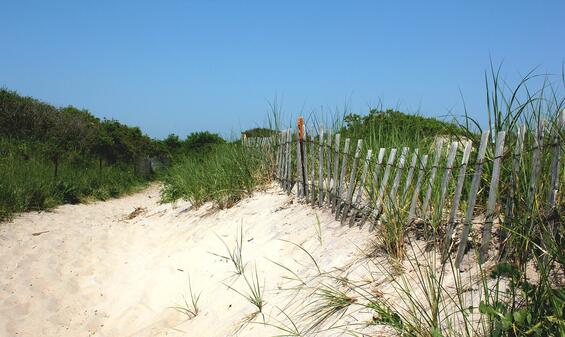
Stick to designated paths to help prevent dune erosion.
- Use StormSmart techniques to protect coastal property - CZM’s StormSmart Properties fact sheets give coastal property owners information on a range of measures that can effectively reduce erosion and storm damage while minimizing impacts to shoreline systems. From using artificial dunes to sand fencing, see the StormSmart Properties Fact Sheet Index to find “how to” instructions for homeowners.
- Build better boardwalks - Proper design of walkways, stairways, and other beach-access structures helps to prevent coastal erosion. For example, elevating walkways allows sunlight to reach plants underneath, stimulating the growth of root systems that stabilize the sand. Check out CZ-Tip - Basics of Building Beach Access Structures that Protect Dunes and Banks for details on proper design and installation.
- Buy locally grown - The ingredients for an average U.S. meal travel 1,300 miles from farm to market—and off-season produce leaves some big carbon footprints. In addition to reducing fossil fuel emissions from shipping, eating both locally and seasonally has many benefits. Farmers who sell directly to local consumers can focus on freshness, nutrition, and taste instead of the crop shelf life. Eating locally is also good for local economies and helps preserve farmland as open space. For details on how and where to buy locally grown produce, see Massachusetts Grown… and Fresher.
- And don’t forget local seafood - Local is the key word—the shorter the distance from the sea, the fresher the fish (and the less petroleum used in transport). See Seafood 101 (PDF 6.78 MB) for useful information about local fisheries and sustainable seafood choices from the New England Fishery Management Council, NOAA Fisheries, and the Massachusetts Division of Marine Fisheries. And to help you make more educated seafood choices, visit FishWatch—where you can search a national database to discover whether a particular seafood is sustainable. Also, see CZ-Tip - Recipes from Coastal New England for recipes featuring local catch, along with additional information on buying local seafood, produce, and even wine and beer.
- Recycle products containing mercury - Mercury, which is toxic to people and wildlife, can enter the environment when products containing this natural heavy metal are broken or disposed of improperly. Mercury accumulates in fish such as tuna, which affects ocean food webs and harms human health. Breathing mercury fumes or touching spilled mercury is also a human health hazard. However, many mercury-containing products (including fluorescent light bulbs, thermometers, button cell batteries, and electronics) can be recycled. See MassDEP’s Recycle Fluorescent Light Bulbs & Other Mercury Products website for drop-off locations and tips on cleaning up spilled mercury.
- Practice clean boating - Improper fueling, boat cleaning detergents, and bottom paints can pollute the water. Boating in sensitive and shallow areas can also harm delicate habitats if not done with care. With minimal effort and expense, however, boaters can help keep coastal waters clean and healthy—a key ingredient for great boating. For details, see CZ-Tip - Simple Steps to Clean Boating in Massachusetts.
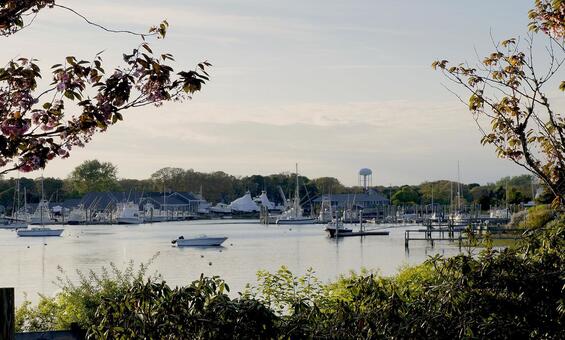
The best boating relies on clean and healthy coastal waters.
- Keep it “clean” and “green” when boat winterizing - In Massachusetts, boats are usually removed from the water for winter storage and must be properly prepared to protect parts from weather and lack of use. This winterizing process can impact the environment—oil may spill during an oil change, fuel can degrade if not stabilized, and boat sewage can pollute coastal waters if not disposed of properly. CZ-Tip - Boat Winterizing—Keep It Green gives information on winterizing your boat in an environmentally conscientious manner.
- Reduce oil and gas impacts from boating - Small drips of oil and gas add up—significantly impacting coastal water quality. When boating, you have many options to reduce these impacts. For example, use an oil-absorbent cloth to catch drips when fueling. Also, buy more fuel-efficient engines, find the sweet-spot for smooth “sailing,” and use the right propeller to save fuel. Finally, place a bilge sock (which is an oil-absorbent pad/sock) in your bilge to help prevent pollution. See CZ-Tip - Simple Steps to Clean Boating in Massachusetts for more ways to reduce fuel and oil impacts.
- Properly dispose of boat sewage - Boat sewage (whether treated or not) can harm water quality and public health. All coastal waters in Massachusetts are No Discharge Zones for boat sewage, and pumpout facilities (including pump-out boats that can come directly to you) are conveniently located along the entire coast to help boaters dispose of this waste. See Boating Basics/No Discharge of Boat Sewage for more on pumping out to protect coastal water quality.
- Become a citizen scientist for the coast - From monitoring water quality to counting birds and sighting sea animals, volunteers can play an important role in advancing scientific knowledge about the Massachusetts coast. And the increasingly popular and convenient online reporting platforms and smartphone applications make participating easy and fun! See CZ-Tip - Sign Up for Coastal Citizen Science to find local opportunities to collect and record data on plants, animals, habitats, invasive species, salt marshes, water quality, erosion, marine debris, and much more.
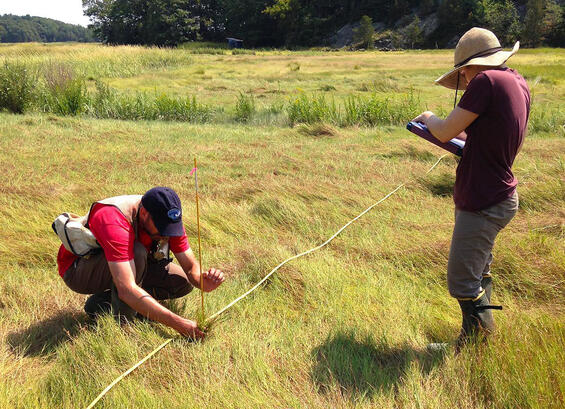
Volunteers help study the growth of invasive species, monitor the effect of salinity levels, assess tidal restrictions, sample fish populations, and gain a better scientific understanding of salt marsh.
- Volunteer your time - Not interested in citizen science? How about maintaining trails at a local land trust, leading an outdoor exploration program at a nature center, or cleaning up trash and other marine debris along the shores? For more volunteer opportunities that focus on coastal stewardship, protection, and community engagement, see CZ-Tip - Volunteer to Help Protect the Coast.
- Get out there and share your love for the coast - We protect what we love, so don’t forget to enjoy the Massachusetts coast as much as you can. CZ-Tip - Explore the Coastal Outdoors provides details on hundreds of public coastal access sites in the Bay State, along with information on hiking, camping, fishing, boating, and more. CZ-Tip - Get to the Shore! focuses on coastal access in the Commonwealth, including public rights and responsibilities, public access sites, and environmental protection issues. You can also love the coast from anywhere (indoors or out) with the online Story Map Tours of the Massachusetts Coast, which include regional highlights of coastal habitats, state parks and sanctuaries, ports and harbors, recreational beaches and waterfront access, and more.
- Find a coastal career - From coastal geologist, to marine mammal specialist, to coastal manager—many careers feature the coast and ocean. If you are ready for a job or internship that connects your passion with a paycheck, check out CZ-Tip - Internship/Job-Search Resources: Get into the Blue.
- Learn on the go - Whether you are riding public transportation, waiting for an appointment, or sitting on your couch, take a deep dive into interesting topics about the Massachusetts coast (fact or fiction). For audio content, see CZ-Tip: Cast Away with Coastal Podcasts! for topics from adventure and activism to science and policy. For the bibliophiles, find books in CZ-Tip - Coastal Reading List 101 that feature the Massachusetts coast and highlight fish, storms, shipwrecks, and even molasses as main characters. For a quicker read, take a look at CZ-Tip - Discover Fascinating Features, Forms, and Even Fossils at the Beach for interesting details on how beaches form and the many things that can be found there and CZ-Tip - Seven Public Places Steeped in History in Coastal Massachusetts to learn about coastal historical sites.
- Keep informed - CZM can help you stay informed on the major issues of the Massachusetts coast. Sign up for CZ-Mail, CZM’s monthly electronic newsletter, or follow CZM on Bluesky and X (formerly Twitter) for the latest information on CZM projects, job and grant postings, calendar items, and more. Peruse the CZ-Tips Index for links to dozens of CZM web pages on coastal protection and recreation. Finally, check out the CZM Publications page for the complete list of CZM brochures and fact sheets, guidance documents, technical reports, maps, and other publications.
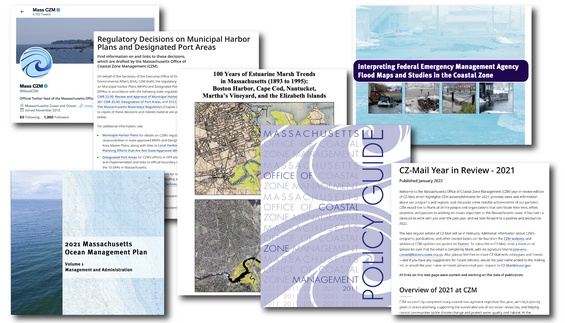
A sampling of the many CZM communications materials available.